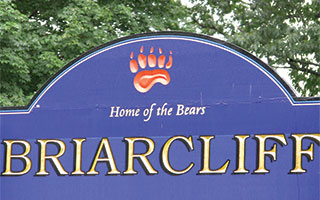 Despite a budget proposal that comes in $225,000 less than last year’s budget, the Briarcliff Manor School District 2013-2014 budget currently before the Board of Education will hit residents with the highest tax rate increase in many years.
Despite a budget proposal that comes in $225,000 less than last year’s budget, the Briarcliff Manor School District 2013-2014 budget currently before the Board of Education will hit residents with the highest tax rate increase in many years.
Unless changes are made to the proposal, Briarcliff residents living within the town of Ossining will see their tax rate increase by 5.08%, the highest since a 7.02% increase for the 2007-08 budget. At the same time, Briarcliff
residents in the town of Mt. Pleasant will have their rate increased by 9.59%, the highest listed in the district’s proposal, dating back to the 2006-07 school year.
The proposal before the Briarcliff Board of Education (which has not been adopted at press time but is up for vote at the April 23rd meeting) calls for a budget of $47,425,000, which is down 0.47% from last year’s budget of $47,650,000. However, the budget’s tax levy actually increases from $37,632,802 to $39,616,955, resulting in a tax levy increase of 5.27%.
Even with this tax levy increase, it is still almost $2.5 million less than it was six years ago, back when District enrollment was 1,701 as opposed to the 1,547 student enrollment today. The current budget proposal is an
even larger cut, dropping 10.26% from the $52.8 million it was in 2008-09.
However, since this year’s 5.27% tax levy increase is above the amount allowed by the District’s tax levy cap (which came out to 3.28%), the budget will need to be approved by 60% or more of the District’s voters at the ballot box on May 21. Failure to pass the budget could mean an additional $1.9 million in cuts.
“The real challenge [facing the District’s budget] was the assigned fund balance,” explained Assistant Superintendent for Finance and Operations, Stuart Mattey. “Where we were able to roll over almost $2.3 million from last year to this year, part of the preparation for this year’s budget was [working with] a much tighter budget. We looked at our actual spending and brought down our budget numbers to [match what we actually expect to spend]. And when you do that, you don’t have as many dollars to roll over into the next year.”
The end result is that where the 2012-13 budget included over $2.2 million in assigned fund balance which the District was able to roll over from the year before to help keep the tax levy down, this year’s budget only includes $125,000, leaving the District with a gaping $2.1 million hole in revenue.
Along with the revenue issues, Briarcliff is being hit with many of the same cost increases hitting school districts everywhere. Health insurance and retirement costs alone (costs over which the District has no control) have risen over $1.3 million this year. In addition, the District is on the hook for over $300,000 in salary increases in the Central Administration and Operations & Maintenance departments.
Briarcliff has managed to deal with these cost increases with a one-time agreement with the Teachers’ Association for a salary freeze for the coming year. No teacher will receive a raise or climb a “step” on the salary chart in 2013-14, although there are instances, such as the earning of a new graduate degree, that would allow a teacher to move into a new salary lane and earn a higher salary.
The other main cost-saver is the elimination of approximately 35 employees within the District. This includes among others, 11.15 teachers (6 of whom are actually retirements who are not being replaced) and 23 teaching assistants. While the actual course offerings within the District will remain more or less the same (“We tried to affect as few students as possible,” said Mattey), grades 2-6 will move from having one teaching assistant in every class to sharing one teaching assistant per grade.
According to the budget proposal, other budget-induced cuts include the elimination of select assistant athletic coaches and supply reductions within the athletics department, and a reduction in both field trips and co-curricular activities.
Mattey believes that this year’s budget, and the tax levy increase included within, will set the District up to be financially solvent for the near future. “Certainly the one challenge that we have this year that we won’t be faced with next year is [the drop in revenue due to the lower] assigned fund balance amount,” he said. “Right off the bat this year we were $2.1 million short. We certainly anticipate that this budget will put us in a better financial situation to manage what’s coming down the pike. We feel we’ll be in a much better financial situation next year.”






